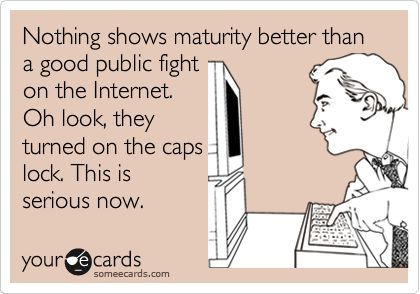
For anyone who's ever created content or been profiled online, you are likely acutely aware of what I like to refer to as the Mean Girls section: the comments. When offered a wifi connection and a little faceless anonymity, people can turn into non-empathetic monsters.
As I began to think about why this abrupt transformation happens -- whereby otherwise relatively respectable, high-functioning people lash out in ways that are generally socially unacceptable -- I was offered a bit of inspiration via the comedic stylings of Louis CK. In his one-hour special, "Oh My God," he does a bit about driving. Read this transcript and replace "driving" with "commenting on the Internet":
I've wasted a lot of time being angry at people I don't know. It's amazing how nasty we can get as people, depending on the situation...If you put people in certain contexts, they just change. Like when I'm in my car, I have a different set of values. I am the worst person I can be, when I'm behind the wheel. Which is when I'm at my most dangerous. When you're driving, that's when you need to be the most compassionate and responsible, of any other time in your life, because you are f-ing driving a weapon... And yet, it's the worst people get. And I am the worst.
One time I was driving, and there was a guy ahead of me, and he sort of drifted into my lane, maybe for a second, and this came out of my mouth: I said, "Worthless piece of sh--!" I mean, what an indictment! What kind of a way is that to feel about another human being? Worthless piece of sh--...That's somebody's son!
I was once driving and some guy in a pickup truck did -- I don't remember even -- and I yelled out my window, I said, "Hey, f-- you!" Where outside of a car is that even nearly ok? If you were in an elevator, and you were like right next to a person's body, and he leaned into you a little bit, would you ever turn right to their face and go, "Hey, f--- you! Worthless piece of sh--...!" No. Literally zero people would ever do that. But put a couple of pieces of glass and some road between you, and there's nothing you would not say to them. "I hope you die!" I said that to a person! "I hope you die!" Why? Because you made me go like this [makes swerving motion] for half a second of my life. Tested my reflexes - - and it worked out fine. So now I hope your kids grow up motherless!
I mean, what am I capable of?! I'd like to think I'm a nice person. But I don't know, man.
We might say that Internet commenting is like driving a car. It's this space where we feel protected -- glass and a road are replaced by a screen -- where we're relatively anonymous and our interactions are detached and fleeting. This invisibility and anonymity often diminishes our sense of accountability. And it's a democratic platform, open to nearly anyone, with the same opportunity to be heard and to express.
Social norms generally safeguard against this type of behavior. The chance that we might encounter the person again, that we might be recognized, that it might tarnish our reputation, or that we might lose our jobs -- these are the unofficial ways in which we police ourselves in most areas of our lives, thereby refraining from yelling profanities and death wishes at the sales clerk who miscalculated your change or the woman whose purse strap keeps hitting you at the restaurant. Instead, we find other more tactical ways of dealing with these issues to keep social order and not lose face.
But in a car -- and on the Internet -- all bets are off. We have a vehicle for fleeing the scene, for logging off from that session. We can act without social consequence, which brings out the worst in us.
One way to diminish this behavior is to require Facebook login for commenting. When people are forced to own their comments, it radically changes the types of commentaries they offer. (Just look to Facebook as the example -- endless comments, most of them positive or at least politely critical. There's not even a "dislike" option!) Requiring Facebook login for commenting is the equivalent of throwing your business card in their window as your flip them off. You are linked to your actions.
Sociological Challenge: Next time you're looking to voice your opinion online, take Louis CK's advice and remember that is a person you're addressing. If you wouldn't give them your real name and say it to their face, best to rephrase. Striking a balance between social etiquette and personal expression is possible. It's the marker of a civilized society -- and clearly, the Internet is still yet to be tamed.

